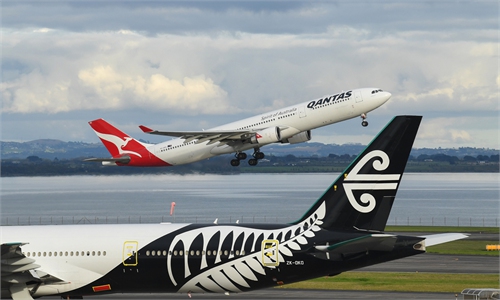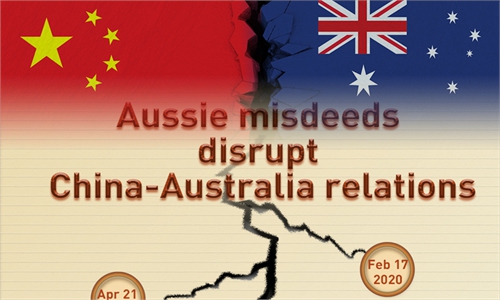
Jacaranda blossoms are seen near Sydney Opera House in Sydney, Australia, Oct. 22, 2020.(Photo: Xinhua)
China's imports from Australia rose by 13 percent to $14.86 billion in April from the previous month, slowing from the 28 percent monthly import growth rate in March, a trend which analysts said mirrors an accelerating trade decoupling between the two countries as China pushes diversification efforts amid icy bilateral relations.
Chinese observers said that the slower growth reflects how Australia's anti-China stance has weighed on economic and trade relations, which were supposed to be complementary and bring mutual benefits. A flattening economic relationship with China could also deal a blow to Australia's post-virus economic recovery.
"China's imports from Australia expanded in April because China still bought bulk commodities from Australia, in particular iron ore, whose price had reached record highs. That, in turn, inflated the value of imports," Chen Hong, a professor and director of the Australian Studies Center at the East China Normal University, told the Global Times on Friday.
The average price for imported iron ore in April reached $164.40, the highest since November 2011, according to data sent by the Beijing Lange Steel Information Research Center to the Global Times.
Analysts noted that the soaring iron ore price has helped Australia offset its losses in the Chinese market in a variety of industries. A long list of Australian exports to China, from wine and lobster to timber and hay, has run into problems, and those exports have almost completely stalled.
The volume of iron ore imports also jumped. From January to April, China's iron ore imports increase by 6.7 percent year-on-year to 382 million tons, customs data showed.
Some Chinese importers also rushed to stockpile Australian iron ore over political risk-aversion concerns, which also drove up trade in April, the Global Times learned.
However, industry observers noted that such imports are likely to continue dwindling this year amid Chinese exporters' push to source iron ore from alternatives such as Africa, and a trade decoupling could gain pace in the immediate future.
Starting May 1, China has scrapped tariffs on certain steel products including pig iron, crude iron and recycled iron raw material. Ge Xin, an industry analyst, told the Global Times that the policy will also help China further expand steel imports, reducing Australian import volume. Also, the supply expansion could help curb the overheating iron ore price, thus shrinking Australia's export value to China.
Data from the Beijing Lange Steel Information Research Center showed that China imported 713 million tons of Australian iron ore in 2020, accounting for 61 percent of China's total iron ore imports. The share decreased 7.51 percentage points compared with 2019, showing an initial result of China's efforts to diversify import channels to reduce reliance on Australia.
The release of the data also comes one day after China's top economic planner indefinitely suspended all activities under the China-Australia Strategic Economic Dialogue, marking the first time that a diplomatic mechanism between the two countries was frozen after the Australian government fired major shots at China.
Analysts said Australia's recent provocative action against China could further send trade relations into an abyss, hurting the economy of Australia, which is more reliant on China.
"The deteriorating relations, of which Australia is to blame, coupled with Canberra's discriminative moves against Chinese firms, will further hurt Chinese businesses' confidence in investing in Australia," Chen said.
In April, the Australian federal government tore up an agreement between the state of Victoria and China on the Belt and Road Initiative (BRI), unilaterally escalating bilateral tensions.


